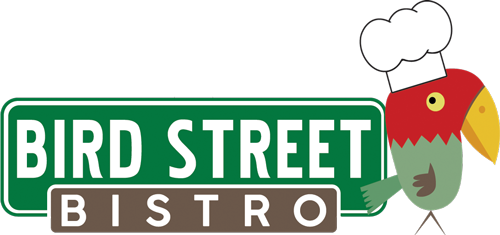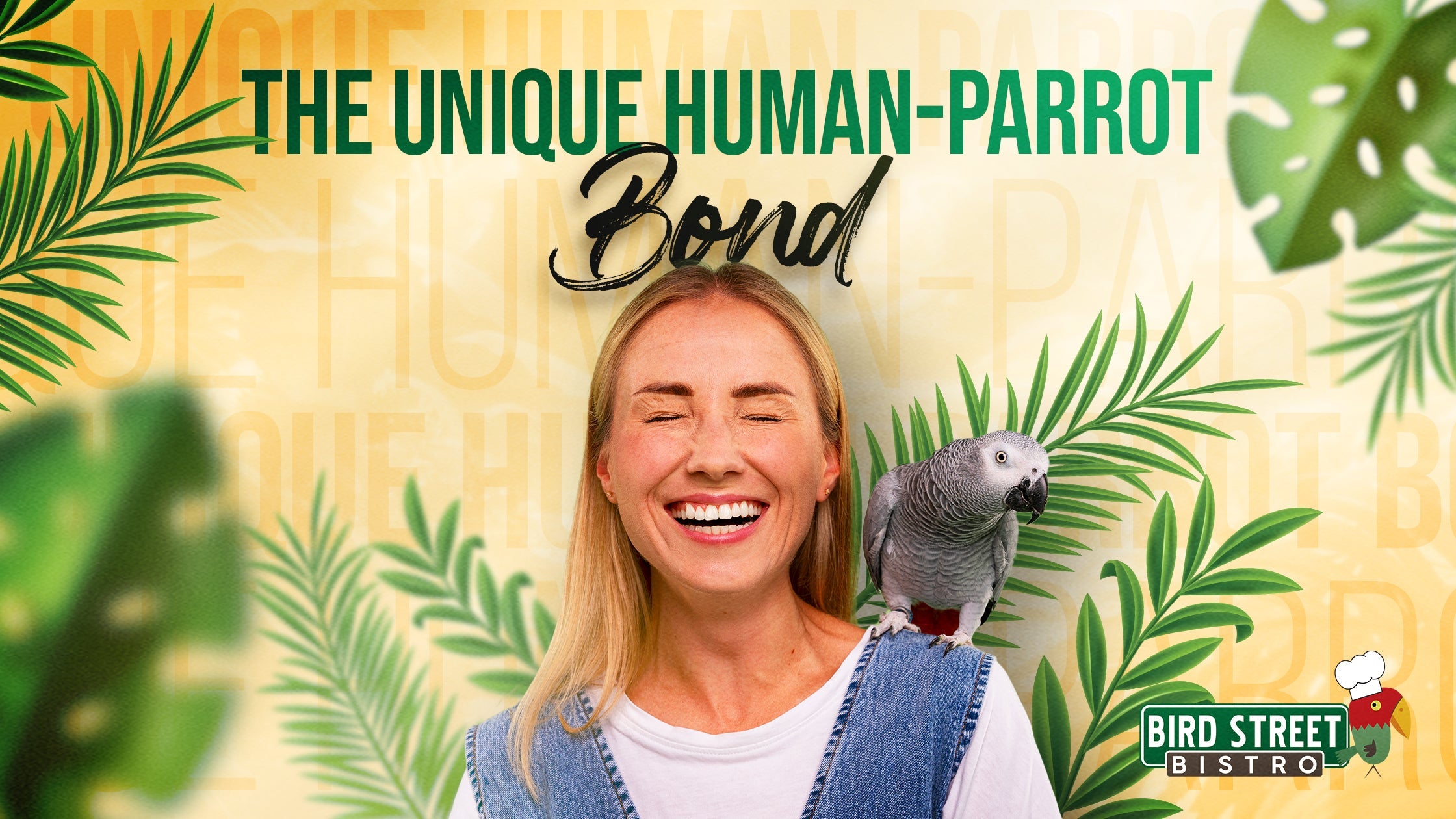The Unique Human-Parrot Bond
I’d like us to examine a topic today that takes a deeper look at what’s at the heart of the relationships we have with our birds. This post won't be heavy with data. In fact, most of what we’ll be looking at is the individual, emotional, subjective experience between human and parrot. You might be someone as prestigious, educated, and respected as notable scientist Dr. Irene Pepperberg with her famous African Grey, Alex, with whom she struggled to maintain a professional distance from with minimal attachment, but found herself deeply caring for and bonded to. Or, you can also be the young girl on TikTok with a small following whose entire account is devoted to sharing videos of her Green-cheeked conure, Kiwi. Anyone with an open heart can fall in love with a bird, and the result is often life changing.
“It’s Just a Bird”

Have you ever had someone say such a thing to you? Perhaps it wasn’t so on the nose, but instead, it was more of a dismissive comment or strange glance. If it were a dog or cat that you fussed over, surely they would understand your obsession? For thousands of years, humans have lived with and formed bonds with those animals, and while we have been sharing spaces with birds for a long time, up until recently, many people regarded birds as automatons - creatures that flew around in the sky, sat in a cage to look pretty, and pooped on our heads. It never occurred to us that they might come close to, or in some aspects, rival human cognition.
The phrase “it’s just a bird” probably creates a feeling of sadness when you consider what a person might mean when they say it. Because it's not just a bird. If you’re like me, then it is so much more than that. It is your friend. It is your family, and it makes your life brighter, more colorful, and infinitely more meaningful just by being in it. Even on days where the world seems mad and I feel sadness come over me, when I look up and see my bird with his foot tucked in and his cheeks fluffed over his beak, I can’t help but smile. For that moment, I remember that any world where that bird exists in it has to be good.
Their Intelligence Captivates Us

There are few animals in the world that are as intelligent as parrots. There’s other intelligent animals, of course, but none which are as accessible to us as parrots. Anyone with money can walk into a pet store and buy a bird. Can you imagine a person walking into a store and buying a chimpanzee? People usually say that to take in such an intelligent animal would be cruel and irresponsible because of how smart they are and the specialized care they require. Many have pushed back against places like zoos and theme parks for keeping dolphins and apes, but when it comes to parrots, they’re smaller and are bred on a large scale, so it’s easy to overlook the immense responsibility of keeping them - animals with cognitive abilities comparable to chimpanzees.
The problem with talking about how smart an animal is, however, is that we are usually measuring animal intelligence against our own. If it doesn’t talk the way we do, or interact with the world like we do, can it really be that smart? Of course, the answer is yes. That intelligence can contribute to the creation of a bond between human and animal like no other. A parrot can challenge us to look deeper at how we care for others and how we see ourselves. If you’ve ever adopted a bird, then you know firsthand how lifechanging giving them a second chance can be. It’s not that by our actions we created a new, better version of the bird - we simply provided them the right environment to show us who they always were. Our patience is tested and thanks to the individuality of each bird, the vision and expectations we had for them are often altered. But with time, a unique love and respect grows in the process - and it often teaches us a lot about ourselves as well.
How Do People See Their Bird?

I’ve run into very few people in my time engaging with parrot owners that consider their bird a “pet.” The word carries a certain expectation with it. Usually, when someone thinks about having one, they think of an animal kept for entertainment, as a hobby, or to keep them company in exchange for shelter and food. Perhaps that’s the expectation when a person initially takes a bird in, but what happens next is often a remarkable change in perception of a bird’s place in that person's life. In fact, even using the words “parrot owner” is weird for me. I use the term for clarity, but it has always felt a bit odd to say.
Maybe they aren’t pets. Maybe they’re something else. I’ve never been a fan of using labels to describe people or animals. It’s far too limiting and often creates a dead end in our ability to evolve and understand one another. While our birds are certainly members of our family, at the same time, the strongest, most meaningful bonds are created by understanding that parrots are complicated, unique creatures with their own way of being. When a healthy bond is fostered with a respect and understanding of the similarities AND differences between our species, that is when a person can really get to know and understand their bird for who they are. They are all individuals, and just as with humans, no two are exactly the same.
There’s a difference between living with an animal and sharing your life with one. Parrots have a way of truly sharing our day with us. They might sit near us and eat while we have our morning coffee, sing, chatter, or squawk while we are trying to talk on the phone to be involved in the conversation, they perch on our monitor while we work, preen and sing while we take our morning shower, and they often seem to comfort us when we’re feeling down. I have had moments of despair during difficult times in my life, and my birds always seem to know when I’m down. One of my birds, a Sun conure named Vlad that I adopted, once came up to me while I was laying down feeling sorry for myself and slowly rubbed his beak against my forehead for about 10 seconds and then left. He’s never done that before and he hasn’t since. He prefers a good amount of space between himself and me. I’m confident that in that moment he understood, and I have no proof of that - but I am convinced.
Every day with our bird is different - but every day is the same. They are by our side. We are the most important member of their flock, and they seem to find great pleasure in exploring the little world that is our house and our days that we share together.
What Does Your Parrot Mean to You?
How can a person not feel strongly for a creature that is as smart as they are and capable of such complex interactions with us? In an ideal world, no parrot would live in a cage. They would fly through the sky and forage with their flock in the open spaces they call home. But, they’re here with us. As long as they’re in our homes, we should strive to create healthy relationships with them - free from the pair bond and full of enrichment and compassion.
I’d like to ask you, what does your parrot mean to you? I’m willing to bet that you don’t see your bird as something to merely keep you company. You probably see them as a part of your family - and one that you share your days with and not just provide food and water for. It’s likely that the bird you picked up from the pet store, breeder, or rescue has changed over the months or years since you brought them home. You probably had an idea in your head of how your life with them would be. But parrots have a way of humbling us. They often teach us that even if a specific formula is followed and every book is read, their personality and our life with them will be unique from any other. We can and should use positive reinforcement to reinforce desirable behavior. But they will still surprise and challenge us with their complex way of being on a regular basis, causing us to re-examine our own behavior.
I’ve spoken to countless people from many different backgrounds and ages that have parrots. The answers they give to the question “what does your parrot mean to you” have many things in common. But the individual experiences people share often vary greatly. Here’s a few.
“My parrot reminds me of what it’s like to be a child, full of curiosity and wonder, and I can connect with that through them.”
“In my parrot I have a best friend - one that senses and comforts me when I’m sad and who’s playful, carefree way of living makes me smile.”
“If not for my birds, I would not have found such a sense of purpose in my life. In them I see nature, and I am reminded that I am only a small part of it.”
That last one is mine. Thanks to my birds, my days are filled with a lot of purpose. I love them more than I can express and I cherish every single day that I have with them. So, I’d say my birds are many things to me. My best friends, my family, my teachers, the sources of my frustration, my inspiration to keep learning, and a connection between me and the beautiful, natural world of which I have always been a part of but lost connection with somewhere along the way. It is thanks to them that I decided to study about birds and their relationships with us. I will always be grateful to them for being my inspiration and my dearest friends.
What about you? What does your parrot mean to you and how have you bonded with them? I would love to hear your responses over at the Bird Street Bistro Flock Facebook group. I recently shared a poll there asking that if a person had to choose one, would they consider their parrot to be a pet, a friend, or a family member. Here’s the results:

It makes sense to me that anyone that takes the time to provide their bird with quality food like that offered by Bird Street Bistro would also consider them family. Though we have a small sample size to go from, I do believe that this would be a common result in most polls regardless of the source.
References:
Güntürkün, Onur, et al. “Why birds are smart.” Trends in Cognitive Sciences, vol. 28, no. 3, Mar. 2024, pp. 197–209, https://doi.org/10.1016/j.tics.2023.11.002.
- Choosing a selection results in a full page refresh.
- Press the space key then arrow keys to make a selection.


